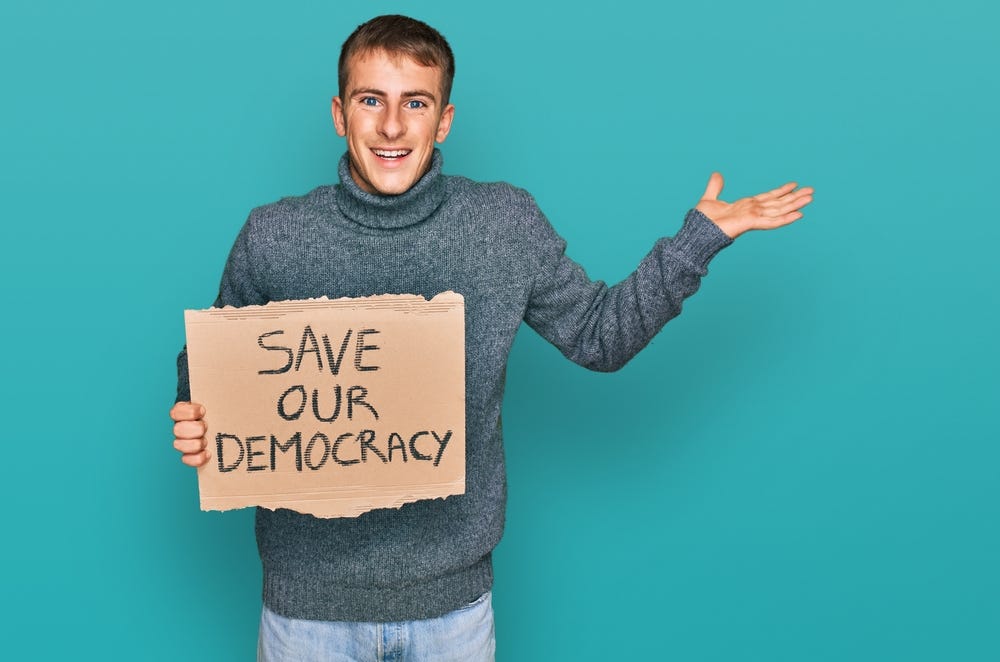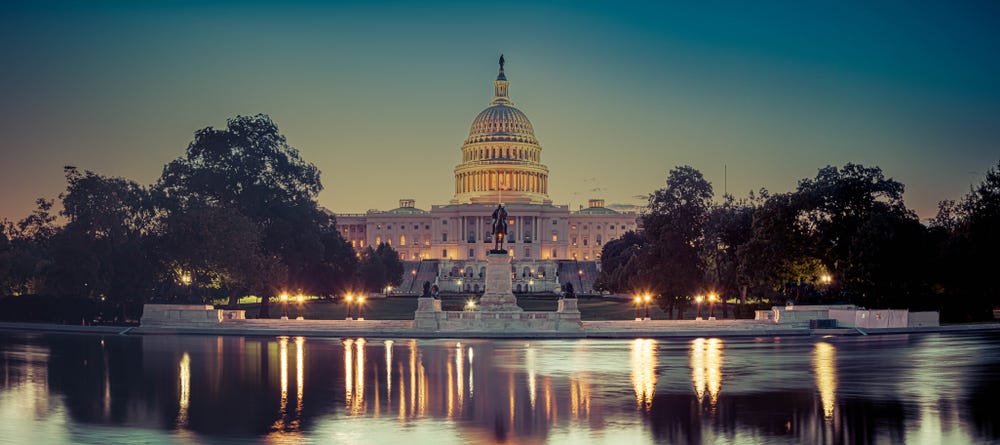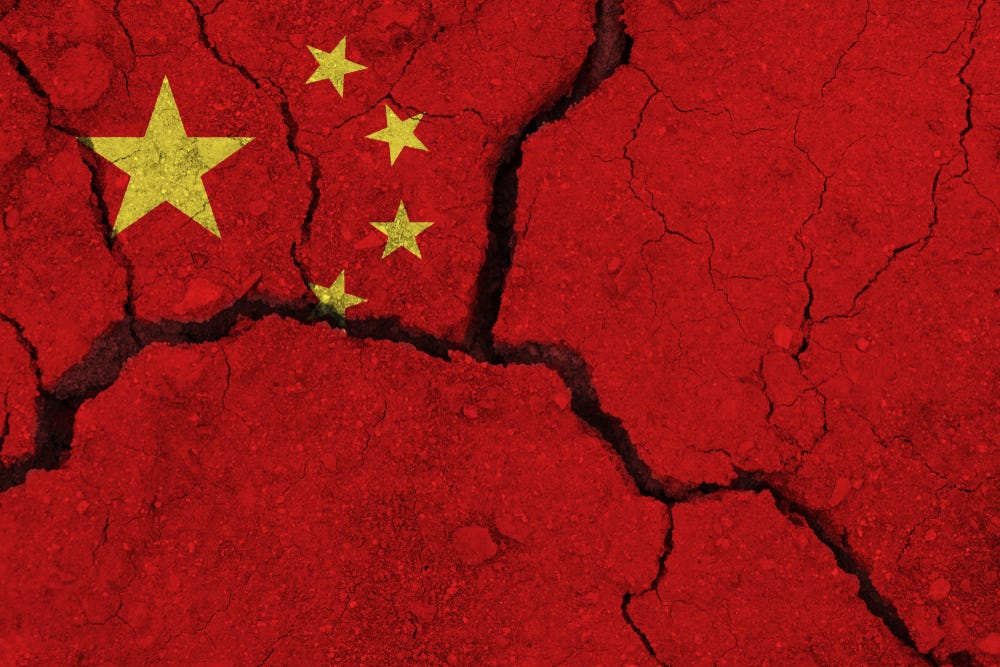E-Pluribus | January 6, 2023
Saving democracy; what does responsible governance look like; and the mirage that is Chinese Communism.
A round-up of the latest and best writing and musings on the rise of illiberalism in the public discourse:
Klon Kitchen: Defeating China and Saving Democracy
The Dispatch’s Klon Kitchen comes from the intelligence community and was Senator Ben Sasse’s national security adviser for a time, but that doesn’t mean his concerns regarding democracy are limited to the shadowy world of spies and international intrigue. Kitchen says government control and attempted control of speech, online and otherwise, remains one of the most serious threats democracy faces.
People have mixed feelings about the internet and social media because they’re a mixed bag of capabilities and outcomes. It’s undeniably true that internet technologies enable individuals and groups to build thick information bubbles that filter out alternative perspectives and important context. It’s also true that online “communities” are built not only by those with a common love for classic cars or sourdough bread; antisemites, political radicals, and people who like Creed are also logging on and linking up. But that’s not the whole story. Underrepresented and oppressed political minorities use internet technologies to connect, to grow, to plan, and to affect positive change. This is why authoritarian regimes from Beijing to Riyadh shut down the internet the moment their citizens start to raise a ruckus. The internet is powerful, and it is wielded by both benevolent and malevolent hands and the best way to maximize the good and to minimize the bad is by exercising our own agency.
Sociologist Robert N. Bellah observed, “One of the keys to survival of free institutions is the relationship between private and public life, the way citizens do, or do not, participate in the public sphere.” More than any piece of legislation, more than any set of content moderation rules (or the lack thereof), governing our own behavior and the behavior of our elected officials on and offline is the best way of restoring confidence in our democracy. It’s a sad fact of our modern predicament that many of the loudest voices screaming about the death of democracy are the ones suffocating our experiment in ordered liberty beneath a blanket of outrage, half-truths, and partisan efforts to “own” the other team—often in a tweet or Facebook post.
Look, I understand and agree that the internet and social media can often be awful and provoke the worst part of us; and, to my shame, I’ve certainly given in to this temptation. But that’s on me and no rule or regulation can fix that. And even if it could, I don’t want to live under a government that thinks it has the ability and the duty to go around “fixing” its citizens or blunting the sharp corners of the public square—and that includes constraining the speech of the platforms themselves. Anyone advocating for such a government isn’t defending democracy, they’re killing it.
Read it all here.
Charles Blahous: The New Year Presents a Rare Opportunity for Responsible Governance
At Discourse Magazine, Charles Blahous expresses cautious optimism that our narrowly divided government in this new year may find a way to get things done. Although the Republicans are currently squabbling with a relatively small bank of rebels over simply naming a Speaker, Blahous says that the more mainstream politicians of both parties have yet another opportunity to put country over party.
The expectation that we are in for gridlock will prove true if both parties remain internally unified and externally uncompromising, colliding repeatedly over the next two years like two opposed battering rams. However, recent U.S. history provides many examples of legislative behavior that follows a different model, wherein split control of the federal government induces the parties’ more centrist members to cooperate, while each party’s extreme wing grumbles on the back benches.
It’s no accident that the last time federal lawmakers successfully balanced the federal budget was in the late 1990s, when Republicans controlled Congress and a Democrat (Bill Clinton) sat in the White House; each party’s participation in making hard choices then gave cover to the other. Going back further, the celebrated Social Security solvency rescue of 1983 happened during Republican control of the White House (under Ronald Reagan) combined with Democratic control (under Speaker Tip O’Neill) of the House of Representatives. That Social Security fix was not only enacted, but it persisted afterwards, because both parties were invested in its success and thus didn’t try to undo it. The parties were also forced to work together during the Great Recession of 2007-2009 and the more recent COVID pandemic, both of which hit when control of the executive and legislative branches was split between the parties, forcing far-reaching emergency relief legislation to be bipartisan.
[ . . . ]
Responsibility and seriousness are often in the eye of the beholder. Among my personal pet peeves is politicians who pompously hold forth on the need to have an “adult conversation” with the other side about a pressing policy imperative. The phrase “adult conversation” practically bubbles with condescension, the obvious insinuation being that the opposing party’s position isn’t even that of a responsible adult, hence progress can only be made when the other side (certainly not the speaker’s) puts aside childish things and agrees to shoulder its grown-up responsibilities. The phrase is usually code for “I don’t want to compromise with the other side, so I’m going to ridicule it to build public pressure to agree to what I want.”
Read it all.
Thomas J. Duesterberg: China’s Myth of Communist Competence
Conventional wisdom in recent decades is that China has been able to manage and shape its version of communism in a way the Soviet Union was unable to. In The Wall Street Journal, Thomas Duesterberg argues that the CCP and Chairman Xi don’t deserve the good press they’ve gotten and the country’s problems are deeper and more intractable than the CCP and even much of the media coverage of that nation would suggest.
As Simone Gao recently wrote in these pages, the end of zero Covid was in large part an admission of the government’s unsustainable financial situation. In early December, Beijing said local governments would be responsible for the cost of daily Covid testing. These already distressed institutions were put in charge of the healthcare emergency in addition to their responsibilities for education, unemployment insurance and retirement. They are also still expected to stimulate economic growth through building infrastructure and subsidizing local industries.
Achieving those goals would be difficult in the best of times. But China’s local authorities have been operating with one hand tied behind their backs, thanks to Mr. Xi’s economic policies. More than 40% of local government revenue in recent years has come from land sales to real-estate and industrial developers. That led to one of the global economy’s largest bubbles, which Mr. Xi attempted to deflate by forcing developers to deleverage their balance sheets and limiting any government bailout of private real-estate firms. The crisis has devastated the government’s balance sheet and contributed to the economy’s slowing. Unemployment crept up to 6.7% in the 31 largest cities in November and is in the high teens for the young.
Few of China’s development needs can be met by the overmatched leadership and faltering finances of local governments. The urban-rural gap remains enormous in poverty, nutrition, education and economic opportunity. Healthcare coverage is weak and forces massive precautionary saving—typically more than one-third of disposable household income, compared with high single digits in the U.S. Water shortages and environmental damage can’t be rectified by overburdened local governments.
Read the whole thing.
Around Twitter
The satirical magazine Charlie Hebdo is under threat again as the anniversary of the massacre draws near, via the Foundation for Individual Rights & Expression:
Glenn Greenwald with some perspective on the House Speaker fight (note: he later corrected his typo on the size of the omnibus bill from $1.7 billion to $1.7 trillion):
And finally, this makes today 1778!










